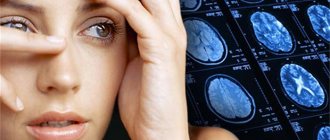.
A specific type of phobia is cardiophobia - fear of cardiac arrest. This phobia is common among young people and children. In the case of strong emotional stress, there is a noticeable increase in the work of the heart. The patient believes that the active work of the heart will lead to a complete stop of the organ.
Cardiophobia - fear of cardiac arrest
Symptoms
Psychologists call the panicky fear of dying from heart disease the term cardiophobia; its symptoms are specific. Anxiety and fear of cardiac arrest can occur even if a person does not have any diseases. He is unable to get rid of the obsessive thoughts that he could die at any moment. When an attack occurs, the following symptoms may occur:
- nausea;
- dizziness;
- internal anxiety;
- slight compression of the heart.
A severe attack may occur with the following symptoms:
- cardiopalmus;
- high blood pressure;
- a feeling of strong compression in the left side of the chest;
- lack of air;
- excessive sweating;
- prolonged fainting, but without loss of consciousness;
- trembling throughout the body;
- anxiety and fear.
The patient develops the feeling that the heart could stop at any second. When he has a panic attack, he nervously begins to ask for help. If panic occurs while driving, you need to stop and calm down.
Causes
The main causes of fear are long-term psychological disorders and increased anxiety. The disease is most typical for people who are insecure and emotionally unstable. Cardiophobia often develops in sanguine people who like to exaggerate everything and do not know what relaxation is.
Cardiophobia can develop after a stressful situation. As a rule, the first symptoms appear after the diagnosis of a serious heart disease in a loved one. Stories about fatal heart attacks are especially frightening.
For some, the first symptoms of phobia occur during a medical examination. The patient may misinterpret a harmless deviation; a picture of death from cardiac pathology is immediately drawn before his eyes. There is a group of patients who really have the disease, but greatly exaggerate the real situation.
Most often, cardiophobia develops with internal anxiety, if a person feels helpless, lonely, and is not satisfied with the circumstances of the outside world. Serious health problems arise due to fears. A person can work himself up so much that he suffers from loss of strength and high blood pressure.
Flow forms
The clinical picture of cardiophobia is diverse; there are 3 forms of phobia:
- Pseudoreumatic. The symptoms are similar to those of rheumatic heart disease. Chronic tonsillitis may occur. The patient complains of shortness of breath, rapid heartbeat, discomfort in the left side of the chest and joints. Symptoms intensify due to physical activity.
- Pseudo-infarction. It manifests itself in those engaged in medical activities or in those who are actively interested in medicine, traditional methods of treatment, etc. Fear of myocardial infarction provokes the occurrence of not very noticeable pain in the heart area; mentally a person directs all attention only to a new attack and subsequent death . He is actively undergoing various examinations and trying to recover. Recurrence of attacks occurs only due to other health problems that should be clarified by a doctor. In this case, medication treatment will not help. The diagnostic results do not show the presence of any pathologies. If there are minor violations, then this turns out to be a tragedy for the patient. He considers his own health condition hopeless and denies treatment.
- Neurotic. There is uncertainty about symptoms and treatment methods. Patients complain of pressure and discomfort in the left side of the chest, loud heartbeat and shortness of breath. Complaints and symptoms are not combined with any heart disease. Sometimes this condition can pass without attacks, but patients continue to limit and control themselves, thinking that they may die. They are afraid to walk down the street unaccompanied.
The main issue in determining the cause of a phobia is establishing a psychosomatic connection. The duration of the attack is from 40 minutes. up to 2 hours. For the patient, the visit of the doctor is more important than taking medication. If he is in a medical facility under the supervision of specialists, then attacks of cardiophobia occur much less frequently, and he does not constantly think about death.
The active formation of a phobia occurs immediately after the first attack occurs. A person experiences fear and anxiety, and the process of waiting for the heart to stop working and death to occur is activated.
Despite the fact that doctors point out to the patient the positive results of the cardiogram, he refuses to accept the information and insists on his own. The haunting fear of cardiac arrest torments both the patient himself and those around him.
The time intervals and frequency of attacks are irregular. Between seizures, the person carefully monitors his heart, carefully monitoring his pulse and recording minimal deviations. Random heartbeats are perceived as clear signs of disease or blood clot rupture, leading to death. He carefully monitors and notes any vegetative non-standard manifestations and minor fluctuations in well-being. Patients use all means to protect themselves from any physical activity or stress, so as not to provoke an attack.
Treatment of cardiophobia
A person is constantly afraid of dying from cardiac arrest, so he tries not to be alone. There are fears that the attack will occur in a dream, and he will not have time to react in a timely manner. For this reason, a persistent disorder may develop in which the patient cannot sleep for a long time. Cardiophobia can be combined with manifestations of other phobias (agoraphobia - fear of open space).
What causes heart palpitations
VSD is often accompanied by interruptions in heart rhythm. At such moments, it seems to a person that his heart stops for a short period of time. This leads to anxiety and fear for one’s life. Often these are the only symptoms of dystonia, which do not always require medical intervention. But if heart palpitations occur frequently, especially if they do not disappear even when the person is at rest or asleep, you should immediately contact a medical facility.
The biggest enemy of heart rate is caffeine. Therefore, to maintain heart health, it is necessary to limit all caffeine-containing products.
This applies to:
- coffee;
- tea (and green tea is more harmful in this regard, since it contains more caffeine);
- coca cola;
- dark chocolate.
If it turns out that a person has consumed more coffee than the established norm (one cup per day), you should try to drink more ordinary clean water.
An unpleasant feeling may be caused by a decrease in blood glucose. If carbohydrate metabolism is normal, you should try to eat small portions at the same time (meals should be at least five times). Breakfast is required.
Moreover, preference should be given to “slow” carbohydrates - these are porridges:
- oatmeal;
- lentil;
- buckwheat
Breakfast should be hearty (the weight of dry porridge should be at least one hundred grams). If glucose is the cause of your symptoms, once your daily routine is normalized, there should be much less irregular contractions.
Missed beats can also occur under stress. Freezing is often caused by a lack of potassium. Unfortunately, if there is a deficiency of this microelement, it cannot be completely replenished with food products. Therefore, it is better to take medications containing potassium.
But extrasystoles should not be taken too carelessly, as they can cause serious disturbances in the functioning of the heart. If a person has changed his lifestyle, does not drink coffee and other caffeine-containing products, takes complexes containing potassium, and the symptoms of heart failure do not stop, he should definitely consult a cardiologist. An ECG may need to be monitored. Thus, it is possible to identify a rare pathology associated with bradycardia or slow heartbeat.
Sometimes a doctor, after examining a patient complaining of heart failure, prescribes a consultation with a psychotherapist.
Often a person unconsciously hides behind heart disease in order to avoid an overly demanding environment. A competent psychotherapist helps people get rid of their fears. Usually the doctor prescribes light sedative therapy. Treating the patient’s nervous system with folk remedies helps a lot. After this, cardiac arrest usually does not require treatment, becomes less common, or disappears completely.
Treatment options
To find out the causes of the phobia, a conversation is held with the patient; if he denies the presence of an unreasonable fear, then he is prescribed beta blockers or tranquilizers. Many patients try to get rid of cardiophobia with the help of alcohol. This method is not effective, and the harm and risk of developing alcohol dependence is very high. Therapy with pharmacological drugs has no effect on the patient's health.
Treatment of cardiophobia involves consultation with a psychiatrist and attending psychotherapy sessions. The sooner therapy is started, the better. By studying the reasons immediately after the first attack, you can stop the development of the phobia in the future. For any emotional disorder, behavioral therapy is recommended to help gain courage and overcome insecurities. The fear that cardiac arrest will occur at any moment can accompany your entire life and bring a lot of inconvenience and problems. With the right approach, treatment of cardiophobia is effective; the patient himself should be interested in his own recovery.
How to get rid of causeless anxiety
Now let's move on to the most important thing: what to do if you feel anxiety for no reason? If anxiety becomes unbearable and significantly reduces the quality of your life, then in any case you need to contact a psychotherapist, no matter how much you would like it. Depending on the type of anxiety disorder you have, he will prescribe appropriate treatment. If we try to generalize, we can distinguish 2 methods of treating anxiety disorders: medication and with the help of special psychotherapeutic techniques.
1) Drug treatment.
In some cases, to treat feelings of anxiety for no reason, the doctor may resort to appropriate medications. But it is worth remembering that pills, as a rule, only relieve symptoms. It is most effective to use a combination of medications and psychotherapy. With this method of treatment, you will get rid of the causes of anxiety and restlessness and will be less susceptible to relapses than people using only medications. However, in the initial stages it is permissible to prescribe mild antidepressants. If this has any positive effect, then a therapeutic course is prescribed. Below is a list of medications that can relieve anxiety and are available without a prescription:
- "Novo-passit"
. It has proven itself in various anxiety conditions, as well as sleep disorders. Take 1 tablet 3 times a day. The duration of the course depends on individual characteristics and is prescribed by a doctor. - "Persen."
It has a similar effect as Novo-Passit. Directions for use: 2-3 tablets 2-3 times a day. When treating anxiety conditions, the course should not exceed 6-8 weeks in duration. - "Valerian".
The most common drug that everyone has in their medicine cabinet. It should be taken every day, a couple of tablets. The course lasts 2-3 weeks.
2) Psychotherapeutic techniques.
This has been said many times on the pages of the site, but I will repeat it again. Cognitive behavioral therapy is the most effective way to treat causeless anxiety. Its essence is that, with the help of a psychotherapist, you pull out all the unconscious things that contribute to feelings of anxiety, and then replace them with more rational ones. Also, in the process of undergoing a course of cognitive behavioral therapy, a person encounters his anxiety in a controlled environment and by repeating frightening situations, over time, he gains more and more control over them.











